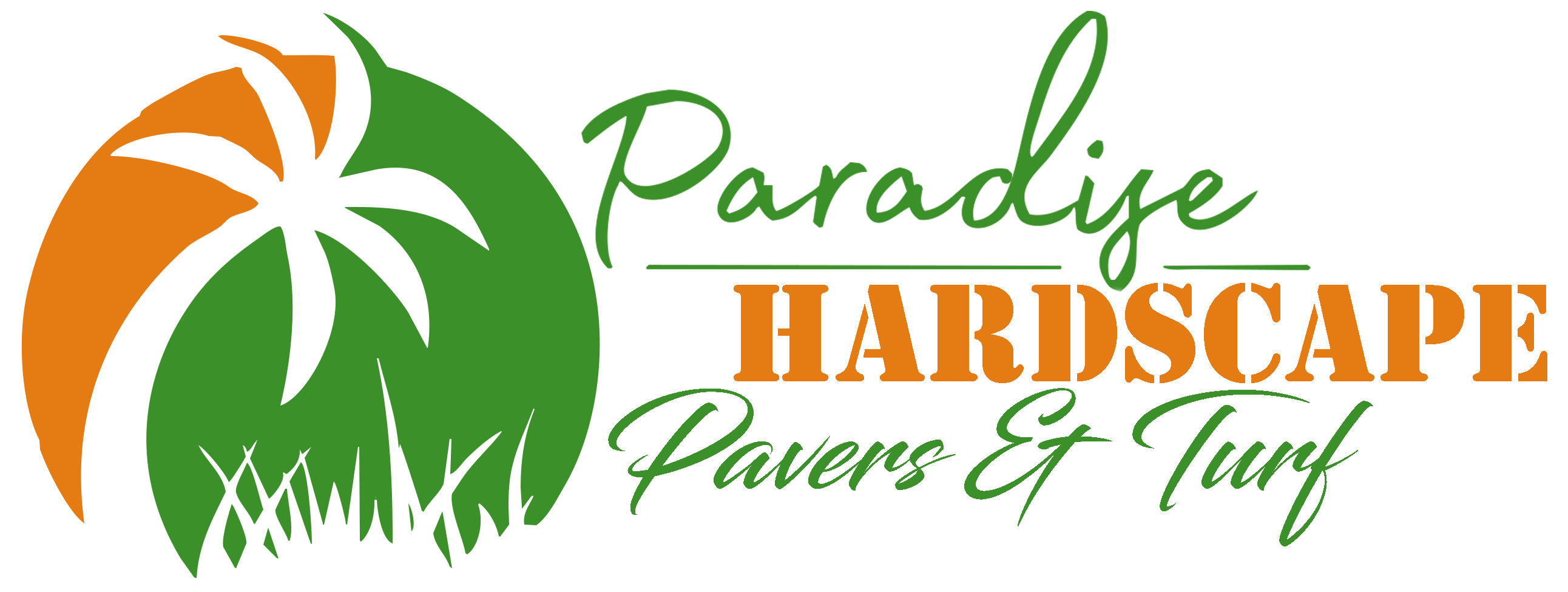How Much Pavers Cost in Phoenix
When considering paver costs in Phoenix, one key aspect to ponder is the type of material you choose.
For instance, the price range between concrete pavers and natural stone can vary significantly.
Understanding the factors influencing these costs will help you make informed decisions for your project.
Factors Affecting Paver Costs
When looking at the cost of pavers in Phoenix, various factors come into play.
The type of material chosen impacts the overall cost, while labor rates can vary significantly.
Additionally, the complexity of the design, size of the project, and the location all play crucial roles in determining the final price.
Material Types Impact Costs
Discussing the various material types that impact costs is crucial when considering paver expenses. In Phoenix, the cost of pavers can vary significantly based on the material chosen.
Concrete pavers are a popular choice due to their affordability, typically ranging from $3 to $6 per square foot.
On the other hand, natural stone pavers, like travertine or flagstone, can cost between $15 and $30 per square foot, making them a pricier option.
Clay brick pavers fall in between these two extremes, with costs averaging around $10 to $20 per square foot.
Each material offers unique aesthetic qualities and durability, so it’s essential to weigh the cost against the desired look and longevity when deciding which paver type to use.
Labor Rates Vary
Labor rates vary depending on the complexity of the paver installation project. When considering how much paver cost in Phoenix, labor is a significant factor that influences the overall expenses.
Here are three key points to understand how labor rates impact paver costs:
- Experience of the Installer: Experienced paver installers may charge higher rates due to their skill level and expertise.
- Project Size and Scope: Larger projects or those requiring intricate designs may incur higher labor costs as they demand more time and effort.
- Location: Labor rates can vary based on the location of the project within Phoenix, with urban areas often having higher rates compared to suburban regions.
Understanding these factors can help in estimating the labor component of paver costs accurately.
Design Complexity Raises Prices
Considering the impact of design complexity on paver costs, it becomes evident that intricate patterns and styles often lead to higher prices due to the specialized skills and additional time required for installation. When intricate designs are chosen, such as herringbone or basket weave patterns, the installation process becomes more labor-intensive.
Skilled labor is essential to ensure the precise alignment and cutting of pavers to achieve the desired look. Additionally, intricate designs may require more time for planning and layout, further contributing to the overall cost. As the complexity of the design increases, the cost of materials might also rise since specific patterns may require more cuts and customization.
Therefore, homeowners should consider the trade-off between design complexity and budget when planning their paver projects.
Size of Project Matters
The size of a paver project significantly impacts the overall costs involved. Larger projects generally require more materials and labor, leading to higher expenses.
Here are three key points to consider when evaluating how the size of a project affects paver costs:
- Material Quantity: Larger projects demand a greater quantity of pavers, base materials, and finishing elements, which contributes to increased costs.
- Labor Intensity: Larger projects often require more manpower and time to complete, influencing labor costs accordingly.
- Equipment Needs: Extensive projects may necessitate the use of additional or specialized equipment, adding to the overall project expenses.
Understanding these factors can help in estimating the budget for paver installations of varying sizes.
Location Influences Pricing
As we explore ‘Location Influences Pricing’ in the context of paver costs, it’s important to understand how geographical factors can impact the overall expenses of a project.
Factors such as proximity to suppliers, accessibility of the project site, and local labor costs all play a significant role in determining the final cost of pavers in Phoenix.
Areas with limited access to suppliers may incur higher transportation costs, ultimately affecting the overall price of materials. Moreover, regions with higher labor costs tend to have more expensive installation services.
Understanding these location-specific influences is crucial for accurately estimating the total expenses involved in a paver project.
Types of Paver Materials
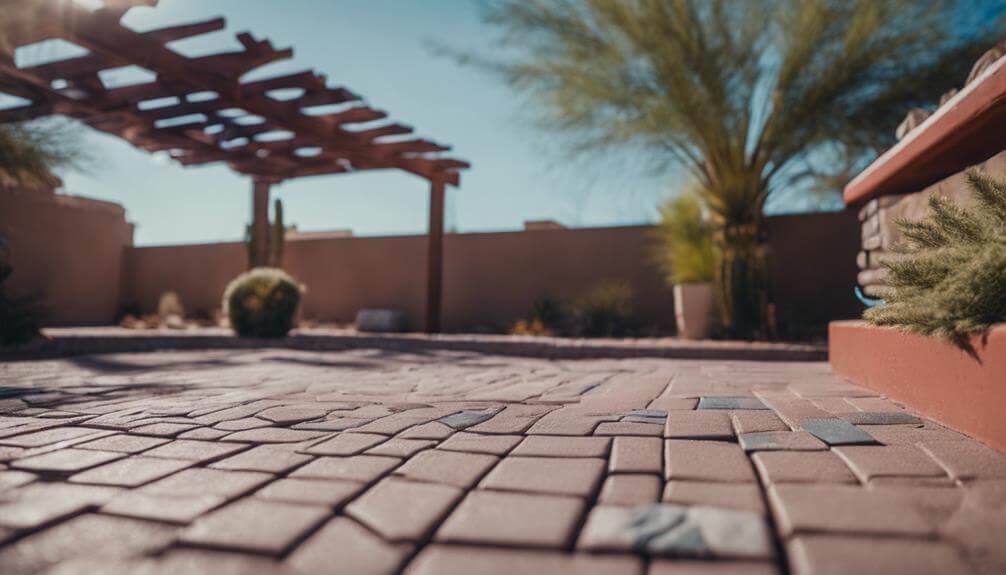
When considering paver materials, we explore various options such as concrete, brick, and natural stone. These materials offer a range of choices to suit different budgets and aesthetic preferences.
Understanding the durability, maintenance needs, and installation requirements of each type is crucial for making informed decisions.
Popular Paver Materials
After researching various options, we found that brick, concrete, and natural stone are the most popular paver materials in Phoenix.
- Brick: Brick pavers offer a classic and timeless look, enhancing the aesthetic appeal of outdoor spaces. They’re durable and come in various colors and sizes to suit different design preferences.
- Concrete: Concrete pavers are versatile and cost-effective. They offer a wide range of shapes, colors, and textures, making them a popular choice for homeowners looking for customization options.
- Natural Stone: Natural stone pavers, such as flagstone or travertine, provide a luxurious and high-end finish to outdoor areas. While they tend to be more expensive, their durability and unique beauty make them a sought-after option for many Phoenix residents.
Cost-Effective Options
Exploring cost-effective options for paver materials in Phoenix reveals practical choices that balance affordability and quality for outdoor projects. Concrete pavers are a budget-friendly option, offering durability and versatility at a lower cost compared to natural stone or brick. They come in various colors, shapes, and sizes, allowing for creative designs while being relatively easy to install.
Another economical choice is gravel pavers, which are typically made from recycled materials and provide a permeable surface that helps with water drainage. These pavers are cost-effective, low maintenance, and environmentally friendly.
Opting for these types of paver materials can help homeowners achieve a beautiful outdoor space without breaking the bank.
Average Cost per Square Foot
As we explore the cost of pavers in Phoenix, the average price per square foot is a key factor to consider. The average cost per square foot for pavers in Phoenix typically ranges from $8 to $12. However, this price can vary based on the type of pavers selected.
Brick pavers are on the lower end of the price spectrum, usually costing between $8 to $10 per square foot. Concrete pavers are slightly more expensive, with prices typically falling between $10 to $12 per square foot. For those looking for a more high-end option, natural stone pavers can cost anywhere from $12 to $20 per square foot.
Factors such as the size of the project, the complexity of the design, and the quality of the materials can all influence the final cost per square foot. It’s essential to consider these factors when planning a paver project to ensure that the budget aligns with expectations.
When calculating the total cost of a paver project, multiplying the average cost per square foot by the total square footage needed will provide a rough estimate. However, additional costs such as labor, equipment rental, and delivery fees should also be taken into account for a comprehensive budget.
Labor Costs for Paver Installation
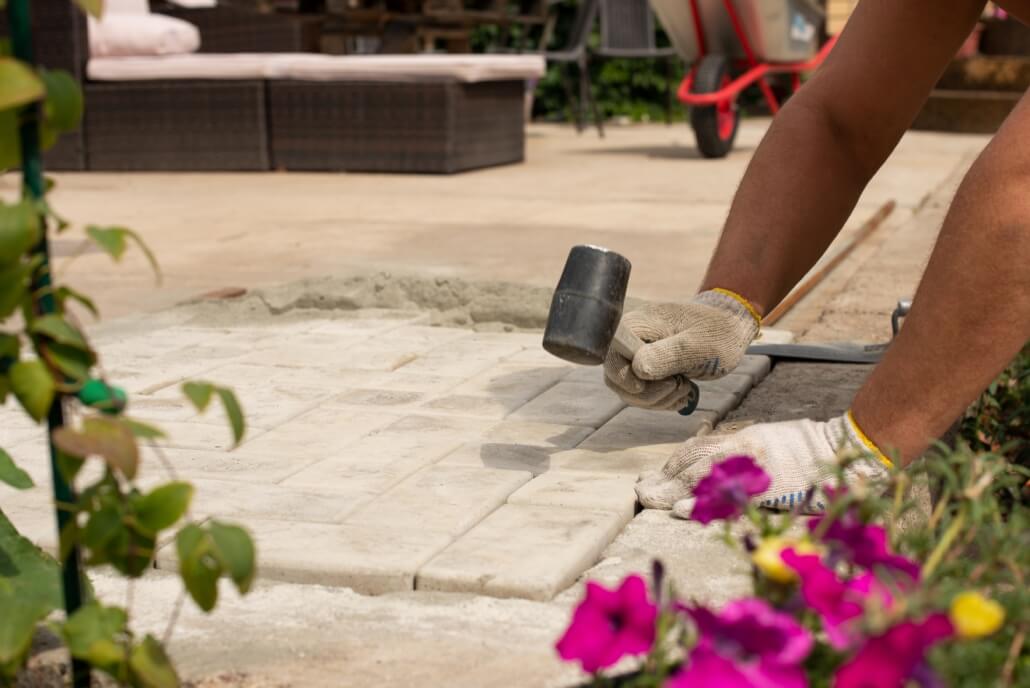
Moving on to the labor aspect, our team will now discuss the costs associated with installing pavers. When considering paver installation, labor costs play a significant role in the overall expenses. Here is a breakdown of the labor costs involved:
- Preparation of the Site: This includes tasks such as excavation, grading, and preparing the base for the pavers. The labor cost for site preparation can vary depending on the size of the area and the complexity of the terrain.
- Actual Paver Installation: The labor cost for laying the pavers themselves is another crucial aspect. This involves placing the pavers in the desired pattern, cutting them to fit specific areas, and ensuring they’re level and properly secured.
- Finishing Touches and Cleanup: Once the pavers are all laid out, there’s additional labor required for finishing touches like adding edge restraints, sand or gravel filling, compacting the surface, and cleaning up the work area. This final stage ensures that the paver installation isn’t only visually appealing but also durable and long-lasting.
Considering these labor costs alongside the price of the pavers themselves is essential for budgeting and planning your paver installation project effectively.
Additional Expenses to Consider
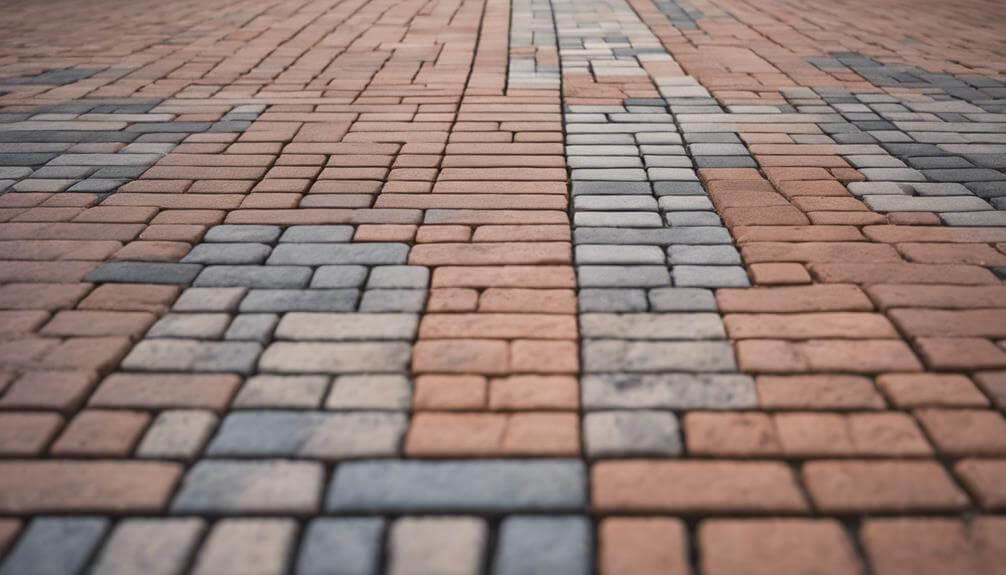
When planning for paver installation, it’s crucial to factor in material delivery charges, labor costs, and equipment rental fees. These additional expenses can significantly impact the overall cost of the project.
Material Delivery Charges
Upon receiving a quote for pavers in Phoenix, it’s crucial to factor in material delivery charges as part of the overall expenses. These charges can vary based on the distance of the delivery location and the quantity of materials being transported.
When considering material delivery charges, keep the following key points in mind:
Distance: The farther your location is from the supplier, the higher the delivery charges are likely to be.
Quantity: Larger quantities of pavers may require special delivery arrangements, impacting the overall delivery cost.
Supplier Policies: Different suppliers have varying delivery fee structures, so it’s essential to inquire about these charges upfront to avoid surprises.
Being aware of these factors can help you accurately estimate the total cost of your paver project in Phoenix.
Equipment Rental Fees
To ensure a smooth paver project in Phoenix, it’s important to factor in equipment rental fees as additional expenses to consider. When planning your budget for paver installation, don’t overlook the costs associated with renting equipment. Here are some key equipment rental fees to keep in mind:
- Compactor Rental: Renting a compactor is essential for properly compacting the base and ensuring the longevity of your paver installation.
- Saw Rental: A saw rental may be necessary for cutting pavers to fit around edges and obstacles, providing a professional finish to your project.
- Plate Compactor Rental: This equipment is crucial for compacting the pavers into the bedding sand, creating a stable and durable surface for your outdoor space.
Comparison of Paver Prices
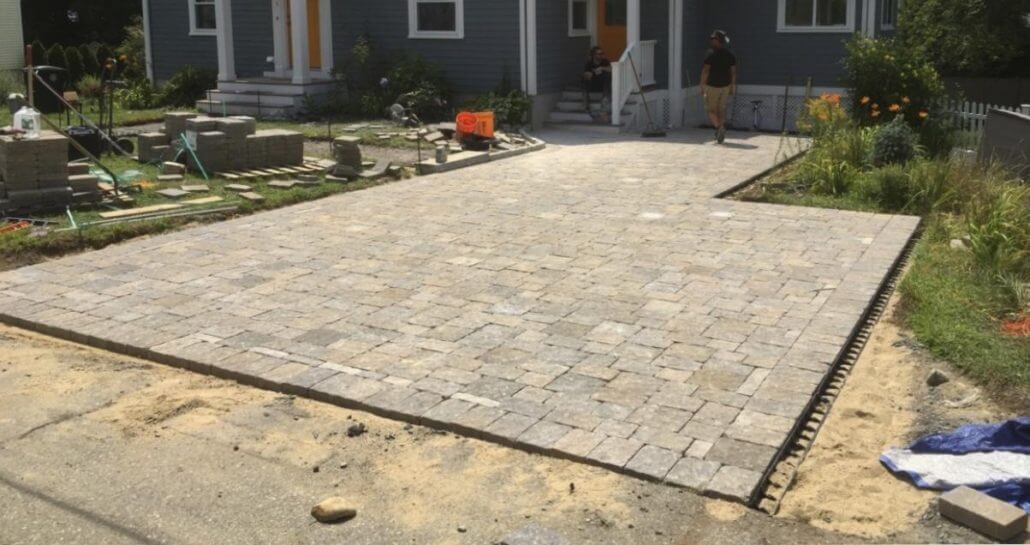
When comparing paver prices in Phoenix, it’s essential to consider the various factors that can impact the overall cost. The type of paver material you choose plays a significant role in determining the price. For example, concrete pavers are generally more affordable than natural stone pavers.
Additionally, the size and thickness of the pavers can affect their cost. Larger or thicker pavers typically come at a higher price point compared to smaller or standard-sized options.
Another factor to consider when comparing paver prices is the design complexity. Intricate patterns or shapes may require more time and effort to install, thus increasing the overall cost. Furthermore, the brand or manufacturer of the pavers can influence the price. Some brands are known for their quality and durability, which can reflect in a higher price tag.
It’s also important to factor in the cost of installation when comparing paver prices. Labor costs vary depending on the complexity of the project, the experience of the installer, and local labor rates. Getting quotes from multiple contractors can help you compare installation costs and choose the best option for your budget.
Getting Accurate Paver Quotes
Securing multiple quotes from reputable paver contractors can help ensure accurate pricing for your project. When seeking quotes, it’s essential to provide each contractor with the same details about the job to receive consistent estimates. This includes the square footage of the area to be paved, the type of pavers desired, any specific design patterns, and the site’s current condition. By offering uniform information, you enable contractors to generate quotes based on identical project scopes, leading to more precise pricing comparisons.
To start the process, reach out to several paver contractors in your area. You can find these professionals through online platforms, local directories, or recommendations from friends and family. Request on-site visits so that contractors can assess the project firsthand. During these visits, inquire about the estimated project timeline, the materials they plan to use, and any potential challenges they foresee. This information won’t only help you gauge the accuracy of their quote but also their expertise and professionalism.
Once you’ve gathered quotes from different contractors, carefully review each proposal. Look for any discrepancies in the scope of work or pricing. Don’t hesitate to ask questions or seek clarification on items that seem unclear. Remember, the goal is to secure accurate quotes that reflect the true cost of your paver project.
Improves Overall Durability
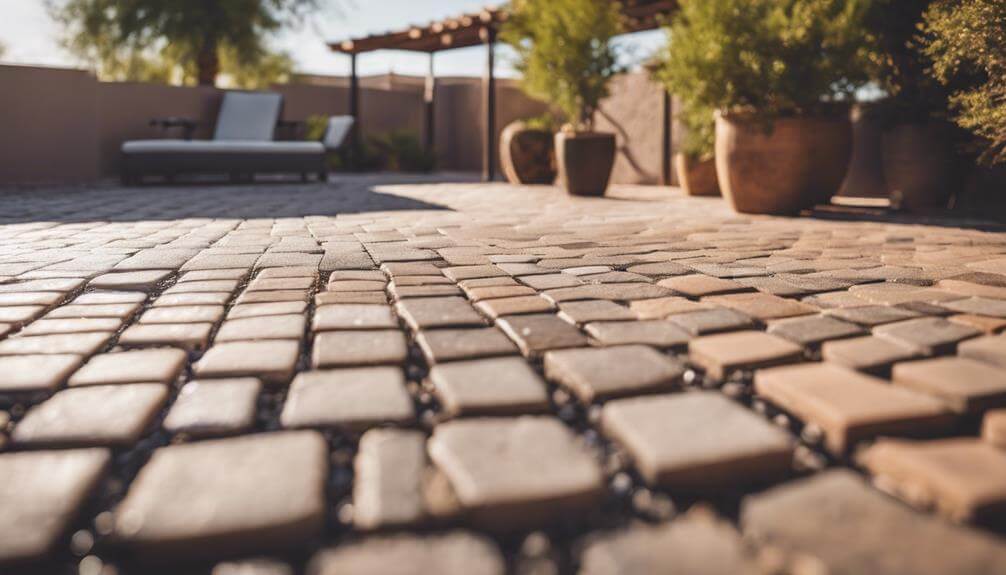
Maintaining sealed pavers not only enhances their appearance and longevity but also significantly improves their overall durability against various environmental elements. When pavers are left unsealed, they’re vulnerable to damage from factors such as UV rays, rain, and heat. Sealing them creates a protective barrier that helps to prevent erosion, color fading, and cracking.
In Phoenix, where the sun shines relentlessly for most of the year, the heat can take a toll on outdoor surfaces. By sealing your pavers, you’re providing them with a shield that reduces the impact of the scorching sun, thus increasing their resistance to heat damage. This protection is essential in maintaining the structural integrity of your pavers over time.
Moreover, sealed pavers are better equipped to withstand heavy foot traffic, vehicle pressure, and the growth of weeds and mold between the joints. The sealant acts as a barrier that repels water, oil, and other substances that could seep into the pavers and cause deterioration. This added layer of defense enhances the overall durability of the pavers, making them more resilient and long-lasting.
In essence, sealing your pavers in Phoenix is a proactive measure to fortify them against the harsh outdoor conditions prevalent in the region. By investing in sealing, you aren’t only ensuring the aesthetic appeal and longevity of your pavers but also boosting their durability and ability to withstand the elements effectively.
Conclusion
Overall, when considering the cost of pavers in Phoenix, it’s crucial to factor in elements like material, size, and labor.
To ensure a successful and cost-effective paver project, I highly recommend reaching out to Paradise Hardscapes for their expert services. Paradise Hardscapes specializes in paver and turf installations, masonry work, concrete services, pool decks, and outdoor kitchens. With over 8 years of experience in the industry and an impressive track record of +30 5-star Google reviews, Paradise Hardscapes is a trusted choice for transforming outdoor spaces in Phoenix.
For a free estimate and to discuss your project needs, you can contact Paradise Hardscapes at (480) 680-8278. By partnering with a reputable company like Paradise Hardscapes, homeowners can achieve their dream outdoor space without compromising on quality or budget.
Make the most of your investment by choosing Paradise Hardscapes for all your hardscaping needs in Phoenix.
